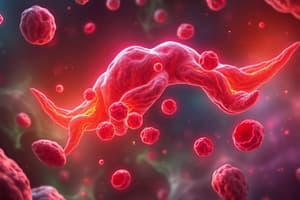Podcast
Questions and Answers
What is one of the neurological symptoms associated with cobalamin deficiency?
What is one of the neurological symptoms associated with cobalamin deficiency?
- Glossitis with beefy red tongue
- Spastic paraparesis (correct)
- Loss of appetite
- Yellow or waxy pallor
Which of the following is a common sign of megaloblastic anaemia linked to cobalamin deficiency?
Which of the following is a common sign of megaloblastic anaemia linked to cobalamin deficiency?
- Increased appetite
- Cognitive impairment (correct)
- High energy levels
- Normal muscle reflexes
What causes peripheral neuropathy in cobalamin deficiency?
What causes peripheral neuropathy in cobalamin deficiency?
- Spongy degeneration of red blood cells
- Impaired distal cutaneous sensation (correct)
- Ineffective erythropoiesis
- Increased DNA synthesis
Which symptom is a result of lateral column involvement in cobalamin deficiency?
Which symptom is a result of lateral column involvement in cobalamin deficiency?
What does ineffective erythropoiesis contribute to in megaloblastic anaemia?
What does ineffective erythropoiesis contribute to in megaloblastic anaemia?
In cobalamin deficiency, which abnormality is observed in vibration sense?
In cobalamin deficiency, which abnormality is observed in vibration sense?
Which of the following is NOT a sign or symptom of megaloblastic anaemia?
Which of the following is NOT a sign or symptom of megaloblastic anaemia?
What is a potential consequence of untreated cobalamin deficiency over time?
What is a potential consequence of untreated cobalamin deficiency over time?
Which of the following is a characteristic symptom of megaloblastic anaemia due to folate deficiency rather than cobalamin deficiency?
Which of the following is a characteristic symptom of megaloblastic anaemia due to folate deficiency rather than cobalamin deficiency?
What role does abnormal DNA synthesis play in megaloblastic anaemia?
What role does abnormal DNA synthesis play in megaloblastic anaemia?
Flashcards
Megaloblastic anemia
Megaloblastic anemia
A condition where the body cannot produce enough healthy red blood cells due to vitamin B12 or folate deficiency, leading to abnormal DNA synthesis and cell division.
Lethargy
Lethargy
A common symptom of megaloblastic anemia, manifested by a lack of energy and feeling tired.
Glossitis (Beefy Red Tongue)
Glossitis (Beefy Red Tongue)
A condition where the tongue becomes inflamed and red due to deficiency in vitamin B12 or folate, causing inflammation of the tongue's tissue.
Cobalamin Deficiency
Cobalamin Deficiency
Signup and view all the flashcards
Peripheral Neuropathy
Peripheral Neuropathy
Signup and view all the flashcards
Subacute Combined Degeneration of the Cord
Subacute Combined Degeneration of the Cord
Signup and view all the flashcards
Pallor
Pallor
Signup and view all the flashcards
Deranged Myelin Synthesis
Deranged Myelin Synthesis
Signup and view all the flashcards
Ineffective Erythropoiesis
Ineffective Erythropoiesis
Signup and view all the flashcards
Loss of Appetite/Weight
Loss of Appetite/Weight
Signup and view all the flashcards
Study Notes
Megaloblastic Anaemia: Signs & Symptoms
- Megaloblastic anaemia is associated with ineffective erythropoiesis, abnormal DNA synthesis and cell cycling, and deranged myelin synthesis.
- Common symptoms include lethargy, weakness, yellow or waxy pallor, glossitis (beefy red tongue or smooth pale tongue), loss of appetite, and weight loss.
- Neurological symptoms, specifically associated with cobalamin deficiency, include peripheral neuropathy and cognitive impairment/decline.
- Cobalamin deficiency can manifest as symmetrical distal sensory symptoms, starting in the feet and progressing to the hands.
- Other cobalamin deficiency symptoms include diminished vibration sense, impaired proprioception (in the legs), impaired distal cutaneous sensation, and altered/absent limb reflexes.
- Lateral column involvement in cobalamin deficiency can lead to spastic paraparesis and autonomic issues like bladder, bowel, or sexual dysfunction.
- Subacute combined degeneration of the spinal cord is a serious neurologic consequence of cobalamin deficiency, involving the spinal cord white matter and causing degeneration of conscious and unconscious proprioception, and further affecting control of skilled movement.
- Early stages of megaloblastic anaemia are often treatable but progressive neurodegeneration can be problematic and irreversible if not properly diagnosed and managed promptly.
Studying That Suits You
Use AI to generate personalized quizzes and flashcards to suit your learning preferences.




